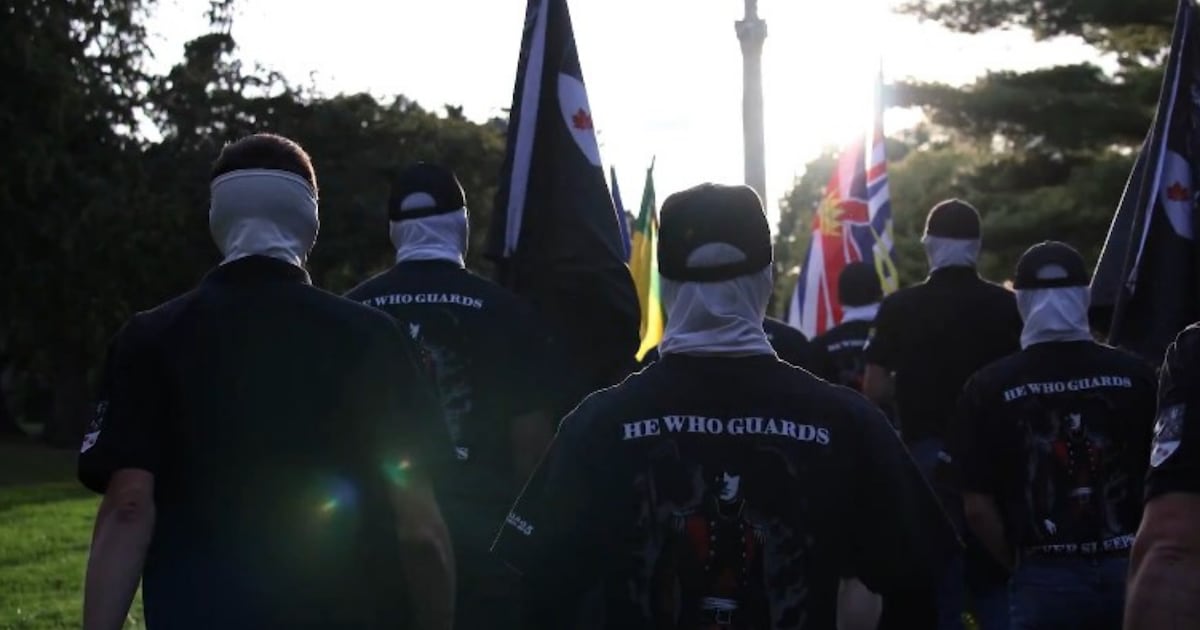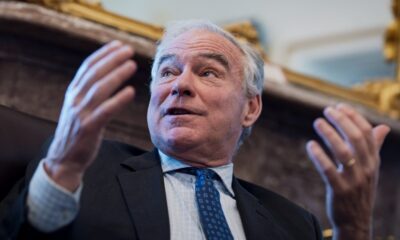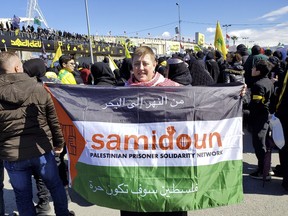Politics
Concerns Rise Over Extremist Groups Following Niagara March

A march organized by a self-identified “men’s nationalist club” in Queenston Heights Park, Niagara-on-the-Lake, on August 30, 2023, has raised alarms regarding the growing presence of extremist groups in Canada. The event, which coincided with the Labour Day weekend, featured members of the Second Sons dressed in black shirts and white face coverings, carrying flags and chanting slogans. Social media images captured the group marching towards Brock’s Monument, a significant landmark in the park.
Participants carried the red ensign flag, a symbol often associated with white nationalist demonstrations. In a video shared by the group days later, its president, Jeremy MacKenzie, delivered a speech at the monument, expressing his discontent with Canadian politicians and bureaucrats, whom he accused of neglecting national identity. MacKenzie described Canada as being “pillaged,” reflecting a narrative that has increasingly become more aggressive and confrontational.
Local authorities responded to a nuisance call regarding the gathering, although Niagara Regional Police reported that the group had dispersed before their arrival. They confirmed that no crimes were reported and stated that the identity of the group was not known at the time. Niagara Parks, which manages the park, issued a statement indicating that the group had not obtained the necessary permit for the demonstration and that their activities do not align with the values upheld by the Niagara Parks Police Service.
Community Leaders Condemn Extremism
In response to the march, Mayor Gary Zalepa of Niagara-on-the-Lake affirmed that hate has “no place” in the community. In a statement, he emphasized that the town does not support the messages propagated by the Second Sons and is committed to fostering an inclusive environment. “This type of hate has no place in our Town,” Zalepa declared, seeking to reassure residents who may feel targeted by the demonstration.
Provincial legislator Wayne Gates also expressed his condemnation of the event, calling it “horrifying.” He reiterated that “hate has no place in Niagara or anywhere in Canada” and emphasized the community’s commitment to inclusivity. Federal MP Tony Baldinelli, who represents the area, did not provide immediate comment regarding the incident.
Despite officials’ condemnation, experts warn that extremist groups like the Second Sons are gaining traction in Canada. According to Professor Barbara Perry, director of the Centre on Hate, Bias and Extremism at Ontario Tech University, there is a noticeable increase in both the visibility and vocal presence of such groups. She noted that the messaging from these organizations has become bolder, reflecting a shift towards more aggressive narratives.
Understanding the Rise of Extremist Groups
The Canadian Anti-Hate Network (CAHN) has classified the Second Sons and similar groups as part of a broader trend of far-right extremism. CAHN has highlighted the growing appeal of these organizations, particularly among individuals feeling disenfranchised or economically threatened. Perry highlighted that many of the industries facing challenges in Canada are male-dominated, creating a fertile ground for extremist recruitment.
“Extremist leaders are adept at manipulating the fears of men who feel they have lost their traditional roles,” Perry explained. She advocates for viewing this issue as a public health concern, emphasizing the importance of education and awareness as preventive measures against radicalization.
The choice of Brock’s Monument for the demonstration is also significant. Erected in 1853 to commemorate the heroism of Sir Isaac Brock during the War of 1812, the monument symbolizes Canada’s military history and national identity. Its selection by the Second Sons underscores a desire to invoke patriotic sentiments while promoting their nationalist agenda.
The rise of groups like the Second Sons reflects a larger cycle of far-right activism in Canada, which has seen fluctuations in visibility over the years. Perry noted that these movements became particularly vocal during periods of social unrest, including during demonstrations related to border crossings and the COVID-19 pandemic.
As communities grapple with the implications of such demonstrations, the importance of fostering dialogue and understanding remains paramount. Local leaders and experts alike stress the need for proactive measures to counteract extremist ideologies and support the values of inclusivity and respect for all residents.
-

 World3 months ago
World3 months agoScientists Unearth Ancient Antarctic Ice to Unlock Climate Secrets
-

 Entertainment4 months ago
Entertainment4 months agoTrump and McCormick to Announce $70 Billion Energy Investments
-

 Lifestyle3 months ago
Lifestyle3 months agoTransLink Launches Food Truck Program to Boost Revenue in Vancouver
-

 Science4 months ago
Science4 months agoFour Astronauts Return to Earth After International Space Station Mission
-

 Technology2 months ago
Technology2 months agoApple Notes Enhances Functionality with Markdown Support in macOS 26
-

 Top Stories3 weeks ago
Top Stories3 weeks agoUrgent Update: Fatal Crash on Highway 99 Claims Life of Pitt Meadows Man
-

 Sports4 months ago
Sports4 months agoSearch Underway for Missing Hunter Amid Hokkaido Bear Emergency
-

 Politics3 months ago
Politics3 months agoUkrainian Tennis Star Elina Svitolina Faces Death Threats Online
-

 Technology4 months ago
Technology4 months agoFrosthaven Launches Early Access on July 31, 2025
-

 Politics3 months ago
Politics3 months agoCarney Engages First Nations Leaders at Development Law Summit
-

 Entertainment3 months ago
Entertainment3 months agoCalgary Theatre Troupe Revives Magic at Winnipeg Fringe Festival
-

 Top Stories6 days ago
Top Stories6 days agoFamily Remembers Beverley Rowbotham 25 Years After Murder





















